Binance vs. Robinhood: Which One Is Better for Trading Crypto and Bitcoin?
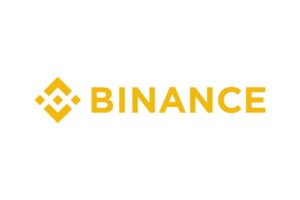
Binance and Robinhood are popular investment platforms in the crypto industry that allow users to trade popular cryptocurrencies like Bitcoin and Ethereum. While both exchanges offer futures and options trading and are designed to help traders hold, buy, and sell crypto, they provide specific features and products that make them stand out.
Binance supports a wide range of crypto assets, offers advanced trading tools, and has low fees, making it suitable for experienced traders. The crypto exchange also allows traders to earn passive income, explore the Web3 ecosystem, and use automated trading spots to execute trades 24/7.
Robinhood, on the other hand, offers commission-free trading and is more beginner-friendly than Binance. While it supports fewer cryptocurrencies, it is a good option for investors who want to trade crypto alongside other traditional financial instruments.
In this article, we will highlight an overview comparison of Binance vs. Robinhood and breakdown their fees, their standout features, and security level to help you determine which is better between Binance and Robinhood. Let’s begin!
Binance Vs. Robinhood: Overview Comparison
Binance and Robinhood offer various features, trading products, and financial instruments for different traders. They are also available to traders in specific countries and unavailable in others. For instance, Binance is a global crypto exchange serving 200+ million users in over 150 countries, except the US and other countries.
Register as a new user on Binance and get a $100 trading fee credit to start your cryptocurrency trading journey.
On the other hand, Robinhood is primarily a US-centric investment platform with a growing user base in the UK and EU. The exchange currently has about 25 million registered users and offers stocks, ETFs, options, and crypto trading to traders in these three locations.
The table below covers a detailed comparison between Binance vs. Robinhood, highlighting their differences and similarities to help you decide which exchange is best for you.
| Exchange | Binance | Robinhood |
| Best For | Experienced and frequent crypto traders. | Small-volume crypto traders, stock, and ETF investors in the US. |
| Founded | 2017 | 2013 |
| Headquarters | Malta | Menlo Park, CA |
| Supported Countries | 180+ | US, UK, and EU only |
| Number of Supported Crypto Assets | 350+ | 22 |
| Trading Fee | Up to 0.1% | Commission-free trading |
| Advanced Crypto Trading Tools | Yes | No |
| Futures Trading | Yes | Yes |
| Staking | Yes | No |
| NFT Marketplace | Yes | No |
| Wallet Support | Binance Wallet | No self-custody wallet |
| Security Features | 2FA, SAFU, cold storage, and withdrawal address whitelisting. | 2FA, automatic log out, FDIC protection (cash only), and Bcrypt encryption. |
| Deposit Methods | Accepted payment methods are crypto, credit/debit cards, bank transfers, and third-party payment processors. | Accepted payment methods on Robinhood are crypto, bank transfers, debit cards, and digital wallets. |
| Customer Support | 24/7 live chat, help center | In-app and email support |
| Additional Services | Launchpad, DEFI Access, P2P Trading. | Stock, ETF, and options trading. |
What Are the Available Cryptocurrencies of Binance Vs Robinhood?
The available cryptocurrencies on Binance are over 350. Meanwhile, the available cryptocurrencies on Robinhood are only 22+. Binance supports major crypto assets like BTC, ETH, SOL, and XRP. The trading platform lists other altcoins and newer projects through their token launchpad.
On the other hand, Robinhood supports trading of other traditional financial instruments besides crypto, including gold, stocks, and exchange-traded funds (ETFs). So, if you need more crypto support, choose Binance, but if you need access to crypto plus other financial instruments, Robinhood is the ideal choice.
How Does the User-friendliness of Binance Compare to Robinhood?
Compared to Robinhood, Binance is more complex, especially for beginners. Due to the extensive features and products on Binance, new traders might find it challenging to navigate the products and services available or decide on the best financial instrument to trade.
To help reduce the steep learning curve, Binance supports copy trading, where inexperienced traders can automatically imitate the trades of more experienced traders. With this trading strategy, new users can potentially make money without previous trading experience. In addition, you will also find educational resources on Binance Academy that can help you get started.
If you are simply considering simplicity and don’t need a wide range of crypto assets, Robinhood is the ideal choice for user friendliness. Robinhood’s minimalist interface makes it easy for new investors to buy and sell cryptocurrencies alongside stocks and ETFs, with fewer complex trading options.
What Are the Fees of Binance Vs Robinhood?
The fees of Binance and Robinhood are crypto fees, Bitcoin fees, and crypto trading fees.
Binance Vs Robinhood Crypto Fees
Binance has a 0.100% trading fee for both maker and taker fees. However, if you hold Binance’s native token, BNB, or have a high 30-day trading volume, you can get up to a 25% discount. On the other hand, Robinhood offers a zero commission fee structure on crypto trades, meaning you don’t pay any upfront trading fees.
Binance Vs Robinhood Bitcoin Fees
When you trade Bitcoin on Binance, the trading fee is still 0.1%, but like with other cryptos, if you use BNB to pay for transaction costs or if you have a high 30-day trading volume, you can reduce this fee. On the flip side, there are no commission fees for buying or selling Bitcoin on Robinhood, which sounds great, especially if you’re just starting.
Although this fee structure is appealing, Bitcoin trades on Robinhood are not entirely free. Robinhood earns revenue through a spread markup, where the buy price is slightly higher and the sell price is slightly lower than the market rate. This spread often ranges between 0.5% and 1.5%.
Binance Vs Robinhood Crypto Trading Fees
Binance uses a tiered maker-taker fee structure, where fees start at 0.1% per trade for both makers and takers. These fees can be significantly reduced by increasing your 30-day trading volume and becoming a VIP trader or by holding and using BNB (Binance Coin) to pay for trading fees, cutting the rate down by 20% for both maker and taker fees.
As a new user on Binance, you can also receive a 10% additional discount on fees and free monetary rewards.
In contrast, Robinhood offers commission-free crypto trading. However, some regulatory organizations, like the Financial Industry Regulatory Authority (FINRA) and issuing banks, charge Robinhood fees for trading, which the broker passes on to you to cover the costs.
What Are the Standout Features of Binance Vs. Robinhood?
The best features of Binance are Binance trading bots, Binance web3 wallet, and Binance referral program, while the best features of Robinhood are multi-asset brokerage, Robinhood Retirement, and Robinhood Gold Card.
The key features of Binance are discussed in detail below:
- Binance Trading Bots
One feature that differentiates Binance is its support for automated trading through trading bots. These bots help users execute trades based on preset strategies, eliminating the need to monitor market movements 24/7 manually. The trading platform offers multiple bots, such as grid bots and DCA (dollar-cost averaging). It also supports third-party API integrations, making automation easier and more accessible for beginners and advanced traders.
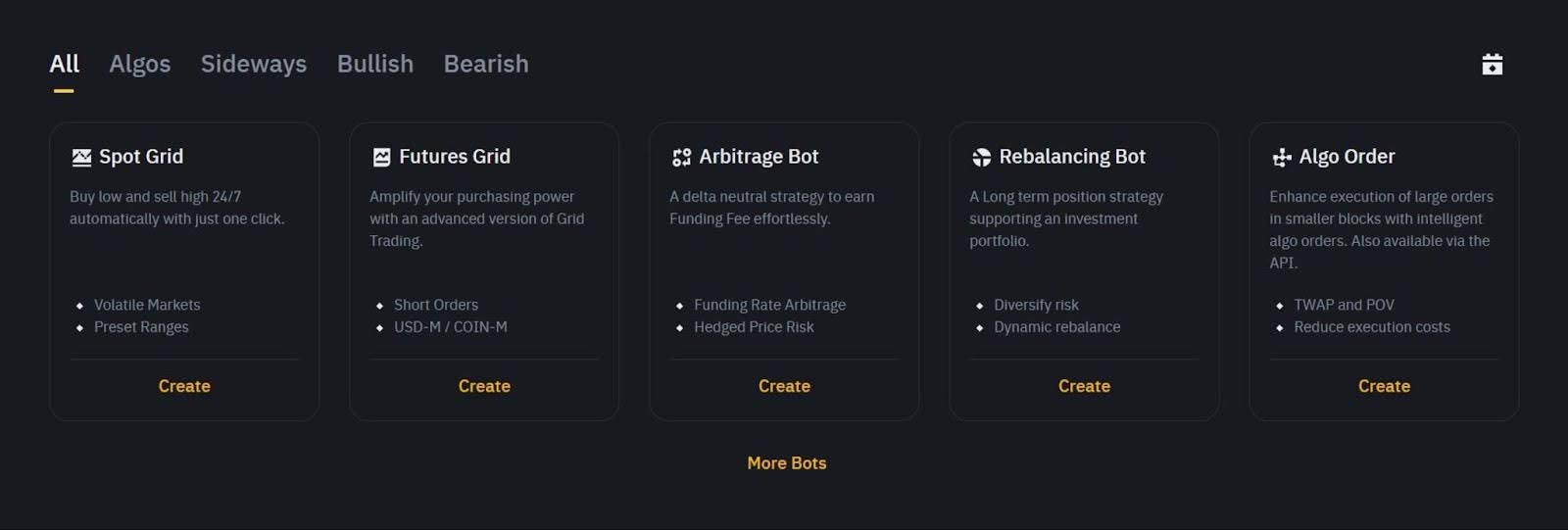
- Binance Web3 Wallet
Binance has a built-in Web3 wallet, which allows users to easily switch to and explore the Web3 ecosystem and decentralized finance (DeFi). The Web3 wallet is a gateway for Binance traders to execute cross-chain token swaps, participate in exclusive airdrop campaigns, and explore various decentralized applications.
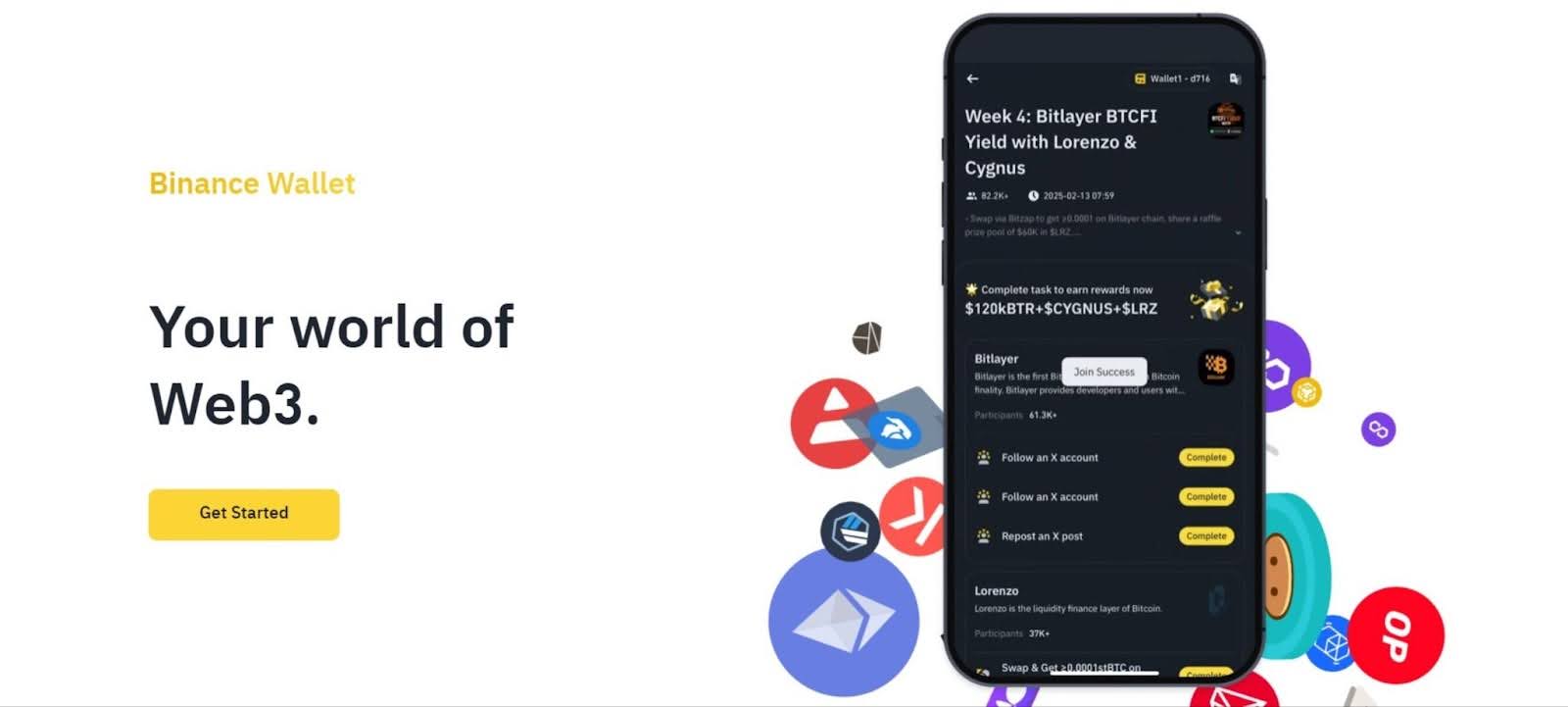
- Binance Referral Program
Binance has a referral program that encourages existing users to refer their friends, family, and community to join the crypto exchange in return for rewards and bonuses. The referral program gives you 20% lifetime discounts on trading fees and up to 100 USDT trading credit.
Open a new account on Binance today to unlock these rewards!
The key features of Robinhood are explained below:
- Multi-Asset Brokerage
Robinhood supports trading of stocks, ETFs, options, and cryptocurrencies. So, if you want to manage stocks, a few major cryptocurrencies, and other traditional financial instruments in one place, Robinhood offers a convenient all-in-one platform.
- Robinhood Retirement
Robinhood Retirement offers Individual Retirement Accounts (IRAs), allowing users to invest in stocks and ETFs. This makes retirement savings accessible, especially for people without employer-sponsored plans. The platform provides a 1% match on eligible contributions for all users, but Robinhood Gold members receive up to a 3% match on annual IRA contributions. Depending on the IRA type you opt for, your earnings can grow tax-free or tax-deferred.
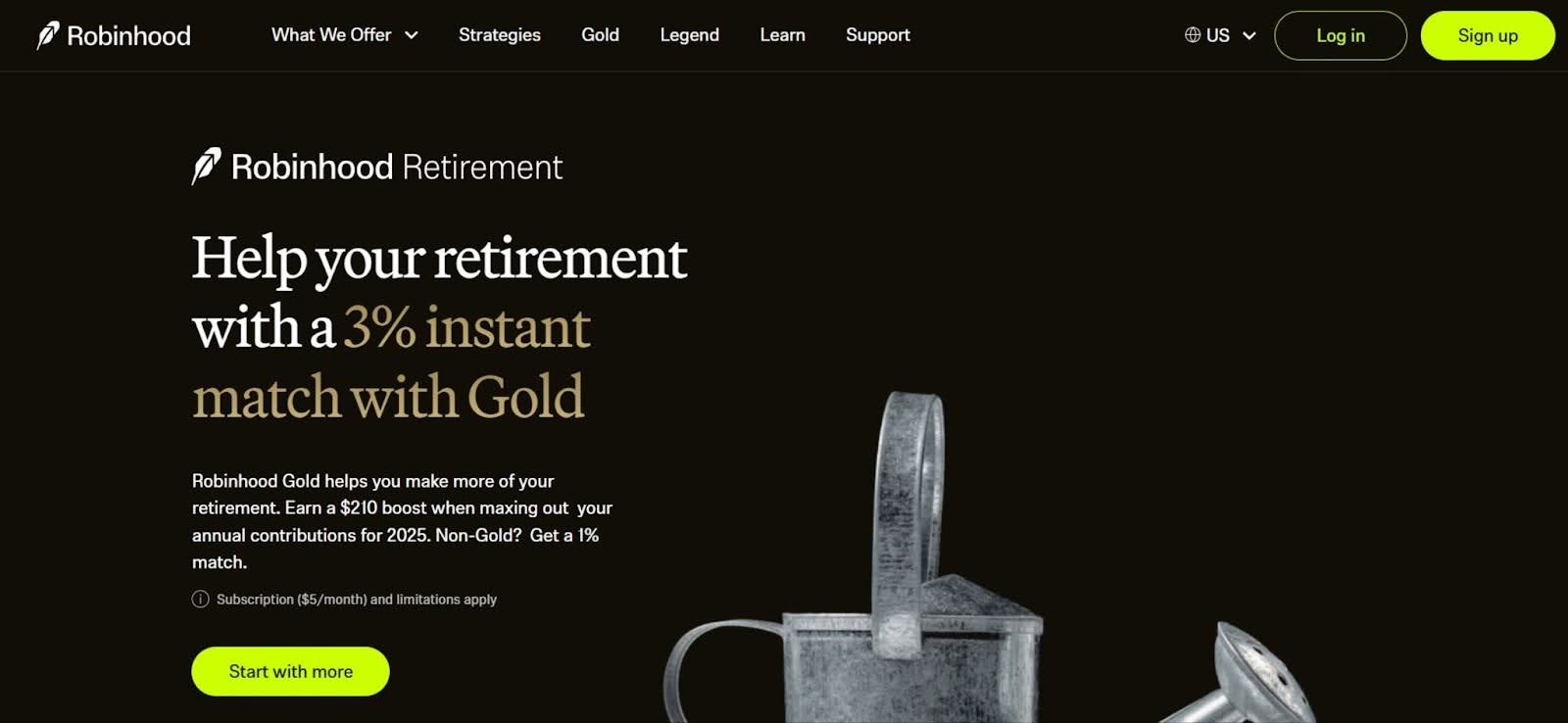
- Robinhood Gold Card
The Robinhood Gold Card is a credit card exclusively available to Robinhood Gold members. Robinhood Gold is a premium subscription service priced at $5 per month, offering members advanced tools and other exclusive benefits like the rewards attached to the card. Cardholders can earn 3% cashback on all purchases and 5% on travel booked through the Robinhood travel portal.
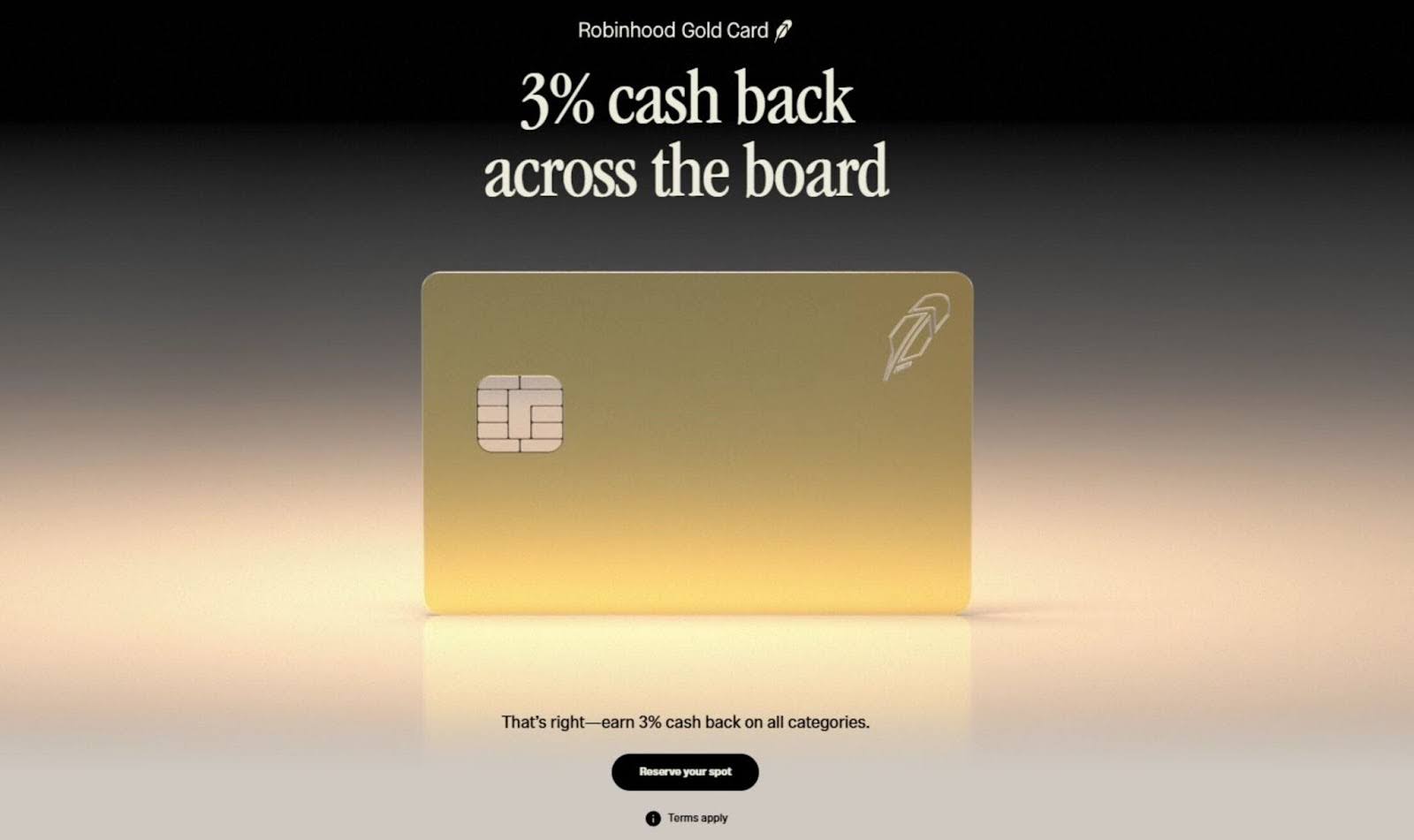
What Is the Security Level of Binance Vs. Robinhood?
Both Binance and Robinhood prioritize security. Therefore, they implement robust security features to ensure the security of users’ funds and data. These strong security measures that both exchanges use are discussed in detail below.
The security level of Binance is Secure Asset Fund (SAFU), withdrawal whitelist, and cold storage.
- Secure Asset Fund for Users (SAFU): Binance has set aside a reserve fund to compensate users in case of security breaches. To fund the reserve, Binance allocates 10% of its trading fees to the SAFU fund, so if a hack occurs due to negligence on the exchange’s end, Binance will reimburse affected users.
- Withdrawal Whitelist: Binance allows you to add multiple wallet addresses to the whitelist and withdraw funds to only those pre-approved wallet addresses. This security feature prevents hackers from transferring funds to any wallet address not listed, even if they gain access to your account.
- Cold Wallet Storage: Cold wallets are kept offline with minimal or no network connection, significantly reducing the risk of hacking and cyberattacks. Binance stores large amounts of digital assets that are not needed for daily transactions in these cold wallets, while hot wallets are used only for daily operational liquidity and withdrawals.
Robinhood’s security level (features) include 2FA, Biometric login, and Bcrypt encryption.
- Two-Factor authentication (2FA): Robinhood encourages users to set up two factor authentication, a security feature that requires users to provide two forms of verification before accessing their accounts. This can help Robinhood users prevent unauthorized access to their accounts even if someone steals their passwords.
- Biometric Logins: Robinhood enabled biometric login, so you can log in using your fingerprint or face scan. It’s fast, secure, and ensures that nobody can access your account unauthorized.
- Bcrypt Encryption: Robinhood protects your login credentials with Bcrypt encryption, a trusted industry security standard. The company encrypts sensitive data like your Social Security number and bank details before storing them. Also, Robinhood uses Transport Layer Security (TLS) on both the app and website to keep your data encrypted while it moves between your device and their servers.
What Is the Customer Support of Binance Vs. Robinhood?
When comparing Binance and Robinhood customer support, we found that the trading experiences and customer reviews for Binance were mixed, but mostly on the better end than Robinhood. Customer reviews on TrustPilot and other platforms indicate that Robinhood customer support could be better.
Many reviews highlight unprofessional interactions with customer service representatives. Instances include support agents being unhelpful, dismissive, or even terminating chats abruptly when faced with complex issues.
Account access issues are another major theme, particularly related to Robinhood’s security and verification processes. Several customers describe being locked out due to ID or facial recognition errors. One frustrated reviewer wrote, “I’ve uploaded my ID, done facial recognition, and still can’t withdraw my funds. Meanwhile, they allowed a debit card that’s not mine to link and pull funds. How does that even happen?”
On the other hand, Binance offers a more structured and responsive customer support system, although it’s not without its challenges. Binance provides 24/7 live chat support, which many users have found fast and helpful.
Unlike Robinhood, Binance allows users to submit support tickets and track their status through a dedicated support portal. That said, Binance isn’t perfect either. The cryptocurrency exchange has faced security concerns and breaches in the past, and some users complain about slow response times during high-demand periods and language barriers in support chats.
Which Is Better: Binance Vs Robinhood?
Binance and Robinhood are both top cryptocurrency exchanges and investment platforms, but they serve different traders. Choosing the right one depends on your goals and experience level.
Binance is built for users who want access to a wide variety of cryptocurrencies, low trading fees, and advanced trading features. It supports hundreds of digital assets and offers tools like futures, margin trading, staking, and an NFT marketplace.
In contrast, Robinhood is designed with simplicity and ease of use in mind. It is ideal for beginners or casual investors who want to buy a few major cryptocurrencies like Bitcoin or Ethereum without dealing with charts, order types, or complex interfaces. The app is clean, minimal, and familiar to those who have experience with stock or ETF trading.
If you are unsure where to start, read this detailed Binance review to determine if it is the best exchange for your trading goals. And if you do choose Binance, don’t forget to use the current Binance referral code when registering to get some welcome bonus perks and other exclusive rewards for completing simple tasks.
Who is Binance Best For?
Binance is best for:
- Global Users: The Binance trading platform is also great for global users as it serves customers in over 180+ countries. Nevertheless, if you’re in the US, you must use Binance.US, as the main exchange is not available there.
- Frequent or High-volume Traders: As discussed earlier, one of the primary features of Binance is its support for hundreds of cryptocurrencies. Besides the supported coins, the exchange offers even more trading pairs with low fees, making it an ideal choice for day traders, high-volume investors, and investors looking for newer crypto projects to invest in.
- Investors Looking for Passive Income Opportunities: If you want to earn passive income while trading, Binance has options like staking, crypto lending, and other programs designed to help investors earn rewards as they trade. This makes Binance great for people who want to make the most of their crypto even when they are not actively trading.
How to Transfer Crypto From Binance to Robinhood?
To transfer crypto from Binance to Robinhood, you need to get the deposit address for the crypto you wish to transfer from Robinhood, then go to your Binance account and go to the withdrawal page. From here, you will indicate the crypto and the network, and then paste the address you copied from Robinhood to complete your transaction. Here is a step-by-step guide;
Before we proceed, it is essential to note that crypto trading on Robinhood is done in a separate account known as Robinhood Crypto, which is different from the Robinhood Financial account.
Step 1. Get Robinhood’s Deposit Address
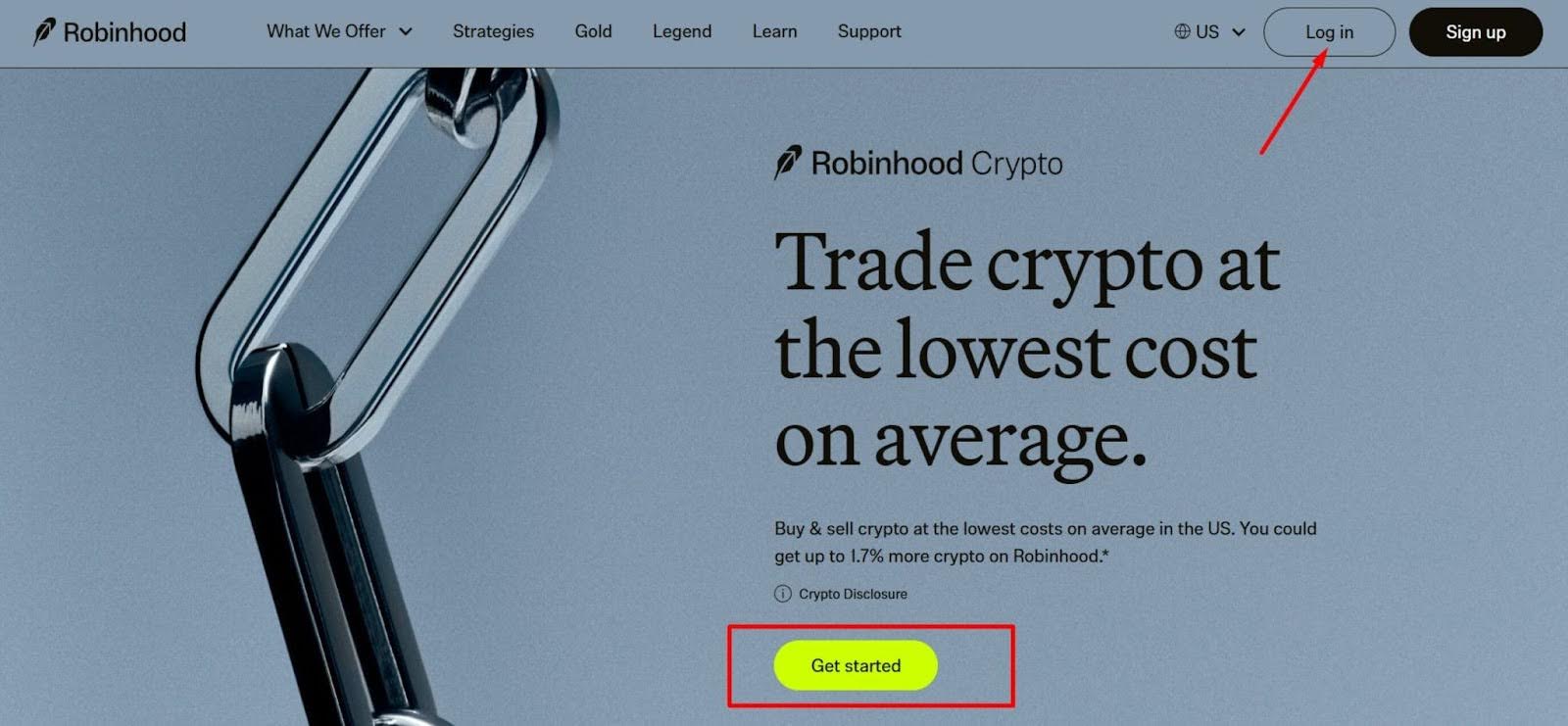
Open the Robinhood app or website and click “What We Offer” at the top of the homescreen. Then, select crypto to go to start trading cryptocurrencies. If you already have an account, you can log in. Otherwise, click “Get Started” to open one.
Once you’ve accessed your account, navigate to the crypto asset you want to receive (e.g., Bitcoin or Ethereum). Select the “Receive” option to generate your unique crypto deposit address. Copy the address, you will need it for the next step.
Step 2. Go to Binance to Withdraw Crypto
Sign up on Binance now and get a $100 trading credit and other exclusive rewards.
Log in to your Binance account and go to the “Withdraw” section. Choose the cryptocurrency you want to transfer (make sure it is the one you selected on Robinhood and the blockchain network.
Then, paste the Robinhood deposit address you copied into the recipient address field. Enter the amount you want to send and review the transaction details to ensure the network matches and that you are transferring crypto to the correct address. Finally, click “Confirm” to proceed with the withdrawal.
Step 3. Wait for the Transfer to be Processed
After submitting, the transfer will be processed on the blockchain. It may take some time, depending on network congestion. But once it is confirmed, the crypto will appear in your Robinhood account.
Note: Always ensure that you are transferring only Robinhood-supported cryptocurrencies.
Is it Safe to Buy Through Binance?
Yes, it is safe to buy crypto through Binance. The platform is one of the oldest cryptocurrency exchanges, and it implements robust security measures to ensure that users’ funds and data are safe. In addition, they have an insurance fund set aside to refund investors who fall victim to a security breach.
Is Robinhood on Binance?
No, Robinhood (HOOD) is not listed on Binance. Therefore, investors cannot buy, sell, or trade the Robinhood coin on Binance.
Who is Robinhood Best For?
Robinhood is best for:
- Casual Crypto Traders: It is also suitable for investors who trade occasionally and don’t need advanced tools or hundreds of cryptocurrencies to trade.
- Stock and ETFs Investors: Aside from having access to a few major cryptocurrencies in one place, Robinhood is a great option if you want to manage stocks, options, futures contracts, and ETFs. It offers a convenient all-in-one exchange to manage multiple financial instruments.
- US and UK-Based Investors: Unlike some popular crypto exchanges, including Binance, Robinhood is suitable for users in the United States and the United Kingdom. It complies with American financial regulations and tax systems and is also a registered financial service business in these locations.
Is Robinhood Good for Crypto?
Yes, Robinhood is good for crypto trading. The platform supports 22+ cryptocurrencies, including BTC, ETH, XRP, SOL, DOGE, ADA, AVAX, XLM, LINK, SHIB, LTC, PEPE, Bitcoin Cash (BCH), COMP, and AAVE.
The post Binance vs. Robinhood: Which One Is Better for Trading Crypto and Bitcoin? appeared first on CryptoNinjas.
